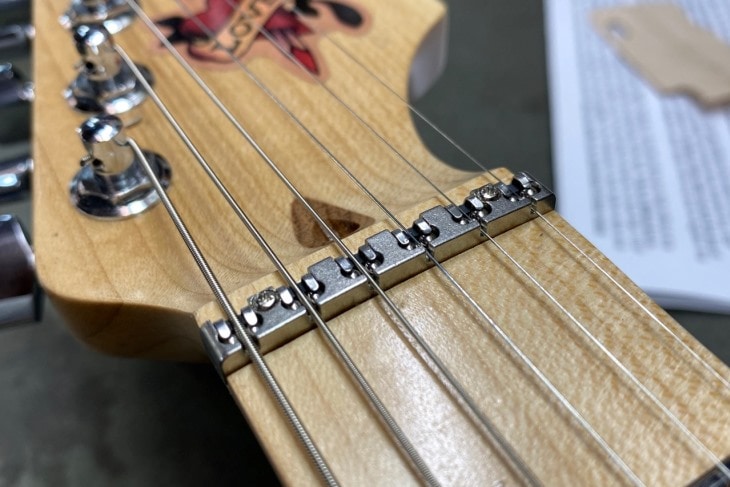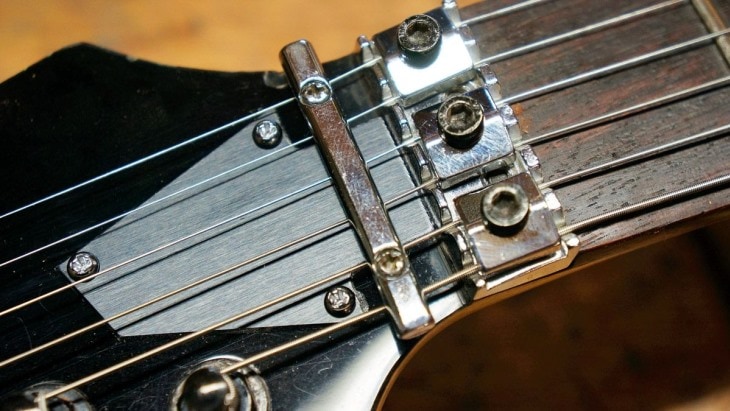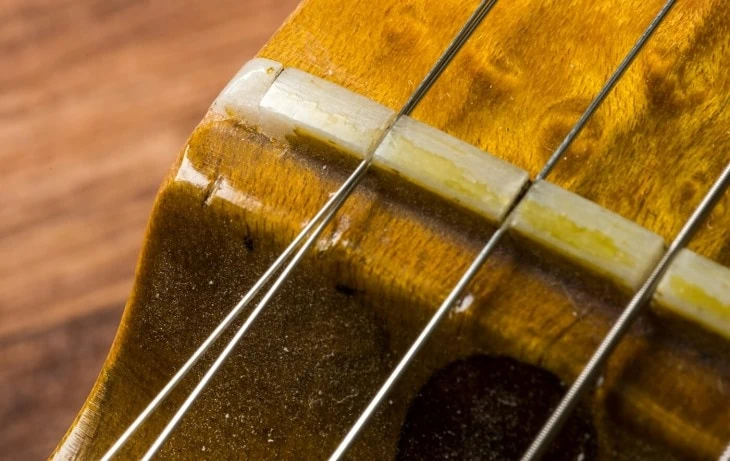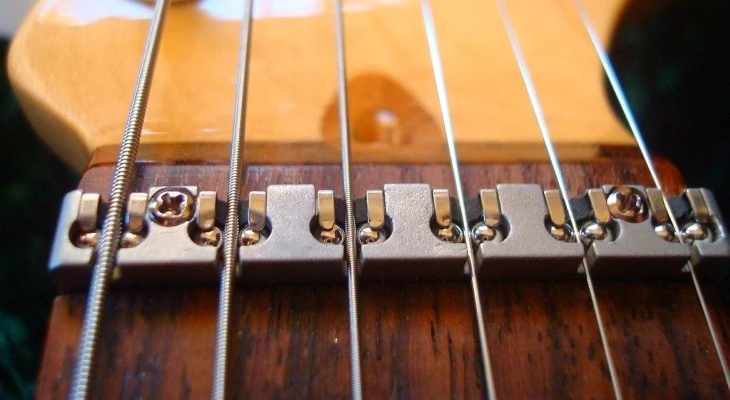So, you recently started embracing your inner Steve Vai, and you are using whammy on every other note and doing extreme bends. But now your guitar keeps going out of tune every five minutes.
You don’t want to keep retuning in between every song. What do you do?
Let me introduce you to the roller nut. Roller nuts are a surefire way of keeping those strings in tune and allowing you to whammy to your heart’s content.
Table of Contents
What Are Roller Nuts?

On a traditional nut, the strings sit in grooves made on the nut. These grooves keep the strings in place but don’t allow for much movement due to the friction caused by the nut.
A roller nut also has grooves, but the grooves have a ball bearing on either side. These bearings reduce the friction on the strings and allow them to move more easily in the groove.
What Are the Benefits of Roller Nuts?
The main benefit of a roller nut is that it allows the strings to move back into a set position. Because of the friction on a normal nut, the strings can’t move all the way back to their original position.
This means that every time you pluck a string, and especially when you use a whammy bar, the strings go slightly out of tune. Roller nuts let the strings move more freely, and there is less friction, allowing the strings to move back to their original position.
The end result is a string that will stay in tune easier and for longer. If you use a lot of whammy while playing, roller nuts are a very convenient thing to have.
What Are the Disadvantages of Roller Nuts?
Roller nuts are slightly larger than bone and plastic nuts. They also aren’t just glued onto the neck like those nuts.
This means that a roller nut is a more permanent replacement than a traditional nut. Once you put a roller nut onto your guitar, you likely won’t be able to go back to a normal nut. You have to be very sure that you want to put a roller nut onto your neck.
Because roller nuts have moving parts, as well as not being self-lubricating like bone nuts, they require more maintenance. Roller nuts wear much easier than traditional nuts, and there is more room for something to go wrong.
A normal nut can typically sit on a guitar neck for years before needing to be replaced. Roller nuts will need to be replaced or repaired more often in most cases.
Roller nuts are also not that common. Depending on the size and shape of your neck, you might not even be able to fit a roller nut on it.
Roller Nuts vs. Locking Nuts

You might be thinking, “Aren’t roller nuts just the same as locking nuts?” And the answer is no, they aren’t.
Locking nuts keep strings in tune by going in the opposite direction. Locking nuts restrict the movement of the strings even further than normal nuts. They “lock” the strings in place, hence the name locking nuts.
While this does keep the strings in tune better than a normal nut, this also places more strain on the strings. Every time you bend or use a whammy bar, you increase the string’s tension.
Roller nuts allow the string to move which keeps the string tension more or less the same. Locking nuts increase the tension, which will wear out the strings much quicker than even with a normal nut.
Why Doesn’t Every Guitar Have a Roller Nut?
The simple fact is that it is just much easier and cheaper to put a bone or plastic nut on a neck. Most guitarists also don’t use that much whammy that a roller nut is necessary.
The second reason has to do with tone. The nut has quite a big effect on your guitar’s tone, and a roller nut changes it quite a bit. Because the nut and bearings are made of metal, you get a brighter, less natural tone.
Are Roller Nuts Expensive?

Roller nuts are a bit more expensive than normal nuts but about the same price as a locking nut.
A normal bone nut like an AllParts is just a few bucks or a little over $10 for a pre-slotted one. The Fender LSR Roller Nut costs about the same as a Floyd Rose Locking Nut.
Conclusion
While roller nuts can be a useful addition to your guitar, they serve a fairly niche purpose. If you play like Steve Vai or Herman Li, just harming away at your whammy the whole day, then a roller nut might be great for you.
But for the average guitarist, the change in tone and effort involved outweighs having to retune your strings a bit less.
But what are your thoughts on roller nuts? Do you think the benefits are worth it?


Hello Dedrich! I have a Dopro roller nut that I am thinking of putting on Strat guitar I’m putting together. The Dopro unit was affordable and looks like it will fit without having to widen the nut slot with my router. Have you had any experience with the Dopro?
I appreciate any info you might have.
Thanks!